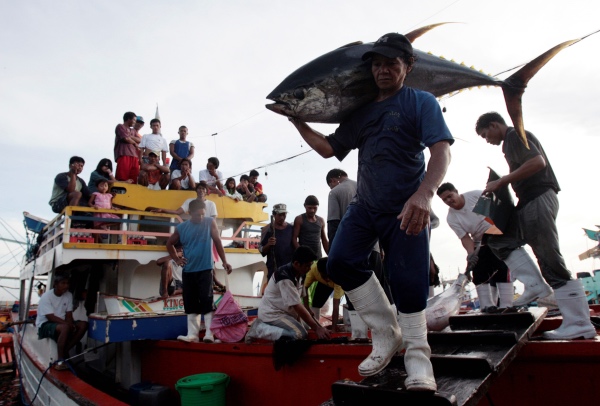London
Thomson Reuters Foundation
About 80 per cent of the world’s biggest canned tuna brands do not know who caught their fish, putting workers in the industry at risk of exploitation and slavery, a human rights group said on Monday.
Of 35 tuna companies and supermarkets surveyed by the UK-based Business and Human Rights Resource Centre, only 20 per cent detailed their supply chains in the Pacific region, which provides 60 per cent of the world’s tuna, according to the World Bank.

Fishermen and their families watch as a worker carries a yellow fin tuna off a fishing boat at fish at a port in General Santos City, Mindanao, southern Philippines, on 10th January, 2008. PICTURE: Reuters/Darren Whiteside/File Photo
The report said only seven companies, including Bumble Bee Foods, Aldi Nord and Thai Union, the world’s largest canned tuna company, disclosed their entire supply chains.
Businesses are under increased pressure from both governments and consumers to disclose what actions they are taking to ensure their supply chains are free from slavery.
“Modern slavery is endemic in the fishing industry, where the tuna supply chain is remote, complex and opaque,” said BHRRC’s Pacific researcher Amy Sinclair.
“Yet despite years of shocking abuses being exposed, tuna companies are taking little action to protect workers,” she said in a statement.
As the demand for tuna grows – an industry worth about $US42 billion – so does the risk of human rights abuses including labour exploitation, slavery and trafficking, BHRRC said.
Thailand’s multi billion-dollar seafood sector has come under fire in recent years after several investigations showed widespread slavery, trafficking and violence on fishing boats and in onshore food processing factories.
Thai Union Group PCL in 2016 pledged to tackle potential labour abuse and overfishing, seeking to clean up the Thai seafood industry.
BHRRC said most companies had failed to enforce their modern slavery policies throughout their supply chains, such as ensuring all subcontractors complied with their policies, or providing a complaints system to all workers down the chain.
British supermarket Tesco, and American chains Walmart and Costco were among 15 companies that failed to respond to the survey conducted by BHRRC between last November and January.
Tesco told the Thomson Reuters Foundation it did not intend to hide anything and had missed the BHRRC survey.
“We are committed to being transparent about our actions to tackle modern slavery in our supply chains,” a Tesco spokeswoman said in emailed comments.
Tesco and Walmart said they were part of the Seafood Task Force, a coalition of businesses and charities that regularly audits fishing vessels to prevent human rights abuses.
“Our approach to helping combat forced labour is to look at the root cause that goes across sectors. We appreciate the increasing need for transparency,” a Walmart spokeswoman said.
Costco did not respond to requests for comment.
More than 40 million people are estimated to be trapped as slaves in forced labour and forced marriages, according to the International Labour Organization and human rights group Walk Free Foundation.
Nearly 25 million work in factories, on construction sites, farms, fishing boats and as domestic or sex workers, says ILO.





